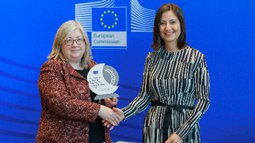Gender Aspects
01WHAT’S UP
-
04 Sep 2024
-
16 May 2024
Commission announces 2023 Gender Equality Champions in Research & Innovation
read more
02INTRODUCTION
Over the past two decades, gender equality and gender mainstreaming in research and innovation have garnered sustained policy attention at EU and Member State level. The recognition of the importance of gender equality in research has resulted in gender equality and gender mainstreaming becoming one of the five priorities for building the European Research Area. In a follow-up step addressing the ERA 2015-2020, the Competitiveness Council called for “translating national equality legislation into effective action to address gender imbalances in research institutions and decision making bodies and integrating the gender dimension better into R&D policies, programmes and projects”. It also invited Member States to take “into account possible synergies and added value of coordination and cooperation between Member States as well as choosing the optimal level of bilateral, multilateral and European cooperation with international partner countries and regions” (Competitiveness Council Conclusions of 29 May 2015).
These commitments were reaffirmed in the Competitiveness Council Conclusions of 1 December 2015 on advancing gender equality in the European Research Area which encourage “Member States and the Commission to set ambitious goals on gender equality and to take appropriate and concrete actions in their action plans or strategies to implement the ERA roadmap by mid-2016”. The Conclusions address sustainable cultural and institutional changes and gender balance in decision-making, and invite MS and the EC to make full use of mutual learning exercises, exchange of good practices and monitoring implementation of policies.
All these commitments build on the recognition that actions and policies must focus on legislative and especially institutional levels (cultural and institutional change) rather than seeing gender equality as something that concerns women and is up to women’s choices and behaviours. This shift from “fixing women” to “fixing institutions” and “fixing knowledge” marks an important recognition at policy level of the systemic barriers and disadvantages facing women in research and innovation and the importance of the gender dimension in research and innovation.
A related important development in building the European Research Area is the insistence that actions must be taken by multiple actors beyond the European Commission: notably Member States, Research Funding Organizations (RFOs) and Research Performing Organizations (RPOs) and other stakeholders. Without sustained efforts by all these actors, gender equality will be difficult to achieve. The Standing Working Group on Gender in Research and Innovation (SWG GRI) brings together representatives of Member States and Associated Countries to advise the Council of the EU, the European Commission and Member States on policies and initiatives related to gender equality in research and innovation (Priority 4 of the European Research Area). It is one of the ERA-related groups of the European Research Area and Innovation Committee. For more on SWG GRI see SWG on gender in research and innovation in the Governance section.
STATISTICS
Whereas the situation shows positive development in terms of the statistical makeup in most EU countries, it is by no means universal (see She Figures 2018). Analysis also shows a correlation between support for research and innovation and support for gender equality. She Figures 2018 reports that women make up almost one-half of all doctoral graduates (47.9% in 2016 compared to 45.9% in 2007) but only account for about one-third of researchers (33.4% in 2016 compared to 33% in 2012 and 30% in 2006). In most countries, the number of female PhD graduates grew at a lower rate than male graduates in various narrow STEM fields, and women make up only 21% of PhD graduates in information and communication technologies and 29% in engineering, manufacturing, and construction, whereas men constitute only 32% of PhDs in education. Furthermore, women continue to be severely under-represented in the Business Enterprise Sector, where they make up only 20.2%. At senior academic levels, women comprised only 23.7% of full professors in 2016, up from 19% in 2007. The rate of change, especially in senior and decision-making positions, is extremely slow. The integration of the gender dimension in R&I is insufficient, too. This continues to compromise the full benefits that diverse groups of the population can glean from research.
FUTURE OF ERA
The SWG GRI and GENDERACTION have delivered recommendations on the future priorities in gender equality in research and innovation in the European Research Area. These include:
- Gender equality must be conceptualised as intersecting with other factors, such as age, health status, disability, occupation, socioeconomic status, migratory status, and geographic location must remain a priority in the future European Research Area.
- The institutional change approach must remain the core principle for reforming all ERA institutions to achieve these policy objectives and priorities.
- An integrated approach to effective framework conditions for gender equality in research and innovation must be enhanced.
- The structures for gender equality in R&I at the national and EU level must continue and be reinforced.
- Research Funding Organisations should require applicants to demonstrate that they have fully considered.
- Gender-based violence and sexual harassment in higher education and research must be considered in all gender equality actions.
- In implementing Horizon Europe, the Commission should adopt concrete measures to incentivize the Widening countries to develop gender equality measures, for example through a dedicated gender-related call for proposals or by topping up Widening project budgets for targeted gender equality measures to be implemented within the project.
- The ERA should stimulate the establishment of women-led start-ups and businesses and provide role models.
- The European Commission, Member States, Research Funding and Research Performing Organizations should pay attention to effectively addressing gen-der equality issues in their new research and innovation collaborations with third countries through bi- and multi-lateral agreements (including JPIs and ERA-Net Cofund schemes inter alia), with a view to foster empowerment, inclusion and solidarity across nations.
08LINKS
EC’s SwafS Gender Equality Policy page
https://ec.europa.eu/transparency/expert-groups-register/screen/…
GEAR Tool to support institutional changes in RPOs
https://eige.europa.eu/gender-mainstreaming/toolkits/gear
Gendered Innovations to support the integration of the gender dimension in research and innovation
https://genderedinnovations.stanford.edu/what-is-gendered-innova…
EC’s publications on gender eqaulity in reserach and innovation
https://ec.europa.eu/research/swafs/index.cfm?pg=library&lib=gen…

